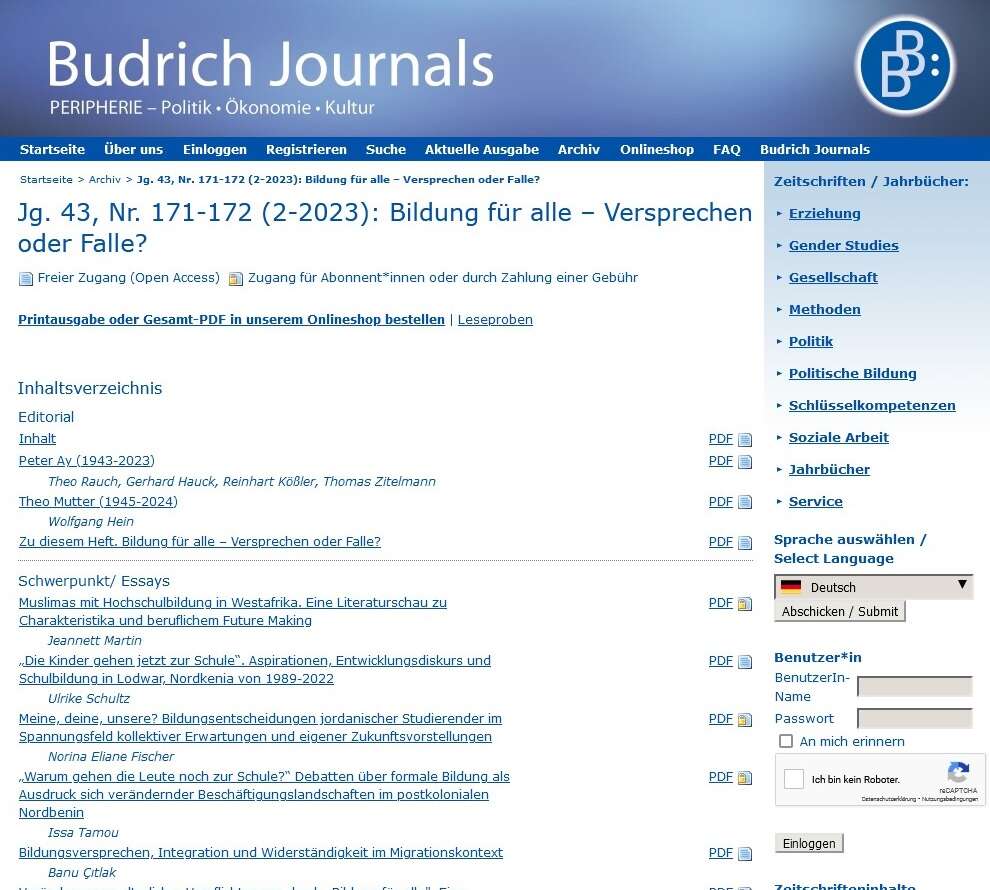Ulrike Schultz publishes in “Peripherie”
13. Mar. 2024
Prof. Dr. rer. pol. Ulrike Schultz, head of the M.A. Development Studies course at Friedensau Adventist University, published one of the focus articles in the latest issue of "Peripherie – Politik, Ökonomie, Kultur", entitled "Education for all – promise or trap?".
Prof. Ulrike Schultz and her colleague Prof. Daniel Bendix – both of whom teach at Friedensau Adventist University in the School of Social Sciences – are members of the journal's editorial team; Prof. Ulrike Schultz is also a member of the team who edited the current issue. The journal Peripherie sees itself as a discussion forum for development theory and development polic.:
In her recently published article, Ulrike Schultz reflects on the educational trajectories of now grown-up children in Lodwar, Northern Kenya, whom she had met during her research visits for her doctoral thesis (1989-1994) and whom she has visited and interviewed regularly as part of various research visits. The life stories show that, in many cases, formal schooling did not lead to social mobility and economic success, but failed to fulfil aspirations.
Bibliographic information: Ulrike Schultz: "Die Kinder gehen jetzt zur Schule", in: Peripherie 43 (2023-2) No. 171–172, pp. 259–286 | The article can be accessed and read here:
https://www.budrich-journals.de/index.php/peripherie/issue/view/3321
The content:
While hopes and expectations for the next generation in many countries of the Global North are shaped by family traditions, gender stereotypes and class affiliation, in countries of the Global South they are closely linked to the development discourse and the associated processes of social change. In this discourse, Western education seems to be the only alternative, not only in terms of oneʼs own future, but also in terms of the development of society. Investigating the case of the Turkana, mobile pastoralists living in Northern Kenya, it became apparent that the aspirations of parents, children and young adults are shaped by this discourse. Reflecting on the biographies of three women and her now adult children, the paper reveals that in view of the economic situation of the Kenyan nation state and the marginalization of the Turkana within the nation state, Western schooling leads not only many young people but also entire families into a trap. Diversification strategies are abandoned and everything is put on one card (schooling). This in turn undermines the conditions that in many cases led to the success of school careers. Fewer and fewer families can draw on resources in mobile livestock farming and sell livestock from time to time to ensure continuous and successful schooling for their children. This development is accompanied by an inflation of degrees and competition in a private education market, in which many Turkana families cannot compete. This leads to an increasing gap between aspirations and the possibilities and opportunities available to young Turkana and their families within the education system and on the labour market. Individual (successful) graduates are confronted with high expectations and many obligations that make it difficult for them to pass on their success to the next generation. This is another reason why, one can speak of an “education trap”.
